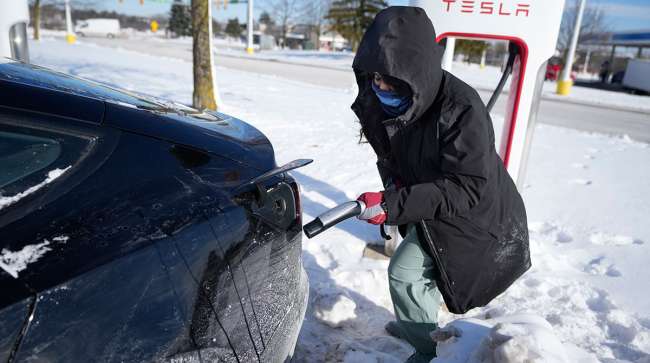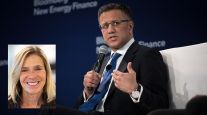Staff Reporter
Governors From 16 States Ask Biden to Roll Back EV Mandates

[Stay on top of transportation news: Get TTNews in your inbox.]
Governors from 16 states have sent a letter to President Joe Biden, asking him to rescind his electric vehicle mandates in favor of letting the market determine adoption.
“We are writing today on behalf of the American consumer to urge you to change course on your current mandate that two out of every three vehicles be battery-electrics by 2032. Instead of using government mandates to drive the vehicle market, allow American consumers to maintain choice in the types of vehicles they choose to drive,” the governors urged Jan. 24.
It was signed by: Arkansas Gov. Sarah Huckabee Sanders, Idaho Gov. Brad Little, Iowa Gov. Kim Reynolds, Louisiana Gov. Jeff Landry, Missouri Gov. Mike Parson, Montana Gov. Greg Gianforte, Nebraska Gov. Jim Pillen, Nevada Gov. Joe Lombardo, New Hampshire Gov. Chris Sununu, North Dakota Gov. Doug Burgum, Oklahoma Gov. Kevin Stitt, Texas Gov. Greg Abbott, South Dakota Gov. Kristi Noem, Utah Gov. Spencer Cox, Virginia Gov. Glenn Youngkin and Wyoming Gov. Mark Gordon.
Stressing that they were not against EVs, the top state lawmakers said they were concerned about federal government mandates that penalize vehicle retailers and fail to “reflect the will” of consumers.
“Even with deep price cuts, manufacturers’ incentives and generous government funding, federal mandates on electric vehicles are unrealistic. The American customer should be able to decide what technology makes most sense for them, not the federal government,” the governors, all Republicans, contended. “There are a number of reasons why consumers are leaving these cars on dealership lots — the cost, the infrastructure required and the battery content requirements are untenable for today’s car buyers.”
Furthermore, the governors noted they were worried about the domestic sourcing of electric vehicle batteries and components.
“China currently accounts for 70% of global electric vehicle battery production capacity,” the letter said. “Bolstering the domestic critical minerals industry is an essential step to realizing any long-term, responsible electric vehicle battery production. Given China’s current action atop the global electric vehicle production, mandating electric vehicle use too quickly can also present a national security risk.”
.@POTUS’s electric vehicle mandate overlooks the need for sufficient infrastructure and fails to address potential costs for the American people in pursuit of an ideological crusade. He should drop his EV mandate and listen to consumers. pic.twitter.com/TTvSHaz1cL — Governor Greg Gianforte (@GovGianforte) January 23, 2024
Other problematic issues they raised involved national challenges in having necessary infrastructure to support battery EVs (such as electrical grid capacity and reliability and adequate EV charging stations) as well as adequate supply chain capabilities for domestic EV battery production, which would have to steadily increase.
“Even if consumers determine over time that battery-electric vehicles are appealing, the reality is that the lack of a strong, domestic marketplace makes electric vehicles prohibitively expensive for the American consumer. While battery-electric vehicles are a promising technology, we believe it will take time to develop the marketplace, to address consumer access and concerns, and to build out the necessary infrastructure,” the governors maintained.
The governors asked Biden to “remove” the federal government’s mandate and let “the free market” determine the direction and timing of the EV industry’s growth rather than the federal government creating orders.
Their letter addressed EVs in general without specifying their views on heavy-duty trucks.
In a related development, U.S. Sen. Pete Ricketts (R-Neb.)a few days earlier criticized Biden’s EV mandates in a press statement he issued about his opinions voiced in the Senate.
He pointed to the recent snowstorms and cold temperatures that gripped much of the nation that underscored problems about passenger EVs that struggled and “do not work in places like the upper Midwest, where we can see these bitter cold temperatures.”
Ricketts said that rural states like his state of Nebraska are unsuitable for EVs, particularly for use in the trucking industry.
“I guarantee you that electric trucks are not practical when you’re hauling livestock,” Ricketts added. “One cannot afford just to pull over and start charging for two hours or even longer when the temperature is below zero. Cattle cannot tolerate it. And then think about not being able to charge at all.”
He said the recent major storms should be a reminder that EVs lack the performance, reliability and driving distance range to work in the Midwest.
“Imposing an EV mandate on Midwestern states like Nebraska is foolish, unworkable. It’s wrong. And I urge President Biden to reconsider this terrible policy. Until he does, I will continue to fight here in the U.S. Senate with every tool at my disposal,” Ricketts added.
Want more news? Listen to today's daily briefing below or go here for more info:




